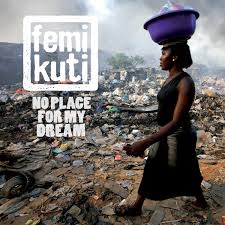|
|
 |
|||||||
|
The Unofficial Website for Fela Kuti and Afrobeat Music |
|||||||
|
CD of the month review: No Place for My Dream by Femi Kuti
In 1998 came the breakthrough album “Shoki Shoki” with his signature tune “Beng Beng Beng”. From then on came collaborations with hip-hop’s finest on “Fight to Win”, the masterfully produced flirtations with Las Vegas Jazz on “Day by Day” to the energetic pan-Africanism of “Africa for Africa”. With his latest album, “No Place for My Dream” Femi Kuti comes full circle with an album that sounds more like “Shoki Shoki” than any of his other albums. The album is not so much a “Shoki Shoki – Part Two” but rather a Femi Kuti 2.0. With Femi returning to his Afrobeat roots while integrating all the lessons learnt on his musical journey. The message on this album is taken to a whole new level. Traditionally, Afrobeat is the medium by which musical dissidents can criticize corrupt African governments. Thirty years ago the Westerner would donate some money to Live Aid to ease his consciousness before heading to the golf court. But the African no longer has a monopoly on suffering. With global warming and a global crisis the black man’s problems are the white man’s problems. Africa is the world, the world is Africa. This is fabulously expressed in the song “The World is Changing”. The two songs that stand out for me on this album are “One Man Show” and “So We See Am”. “One Man Show” was actually written about Femi’s father in the time Femi’s father was still alive and reminds me of the early Egypt 80 material. “Na So We See Am” is a party song where Femi does what he knows best: making high-energy music that commands you to move your body. With the 14-peace guerilla army the Positive Force this album hits you where you feel it. This is definitely Grammy-winning material. “No Place for My Dream” can be bought on Amazon, iTunes or your local record store. Check out the video for the song “The World is Changing” below. |
|||||||
|
|
|||||||
|
|
 Most pop artists at the age of 50 don’t do much else than rehash their greatest hits in a live setting or earn their money by staring in Reality shows. Femi Kuti, however, brings us a new album that can rival with any World Music album of the decade. Femi Kuti is a father of ten children, co-owner of West Africa’s hottest night club. Above all he is (with younger brother Seun) the torchbearer of the Afrobeat movement his late father, Fela Kuti, initiated. Femi started out playing saxophone in his father’s orchestra, Egypt 80. For a brief period, during a time his father was incarcerated on trumped-up charges, he fronted the orchestra. Halfway the 1980’s Femi decided to go his own way. With a faster, more dance-oriented and Motown-influenced version of the Afrobeat concept, he steadily built a name for himself in the World Music circuit.
Most pop artists at the age of 50 don’t do much else than rehash their greatest hits in a live setting or earn their money by staring in Reality shows. Femi Kuti, however, brings us a new album that can rival with any World Music album of the decade. Femi Kuti is a father of ten children, co-owner of West Africa’s hottest night club. Above all he is (with younger brother Seun) the torchbearer of the Afrobeat movement his late father, Fela Kuti, initiated. Femi started out playing saxophone in his father’s orchestra, Egypt 80. For a brief period, during a time his father was incarcerated on trumped-up charges, he fronted the orchestra. Halfway the 1980’s Femi decided to go his own way. With a faster, more dance-oriented and Motown-influenced version of the Afrobeat concept, he steadily built a name for himself in the World Music circuit.